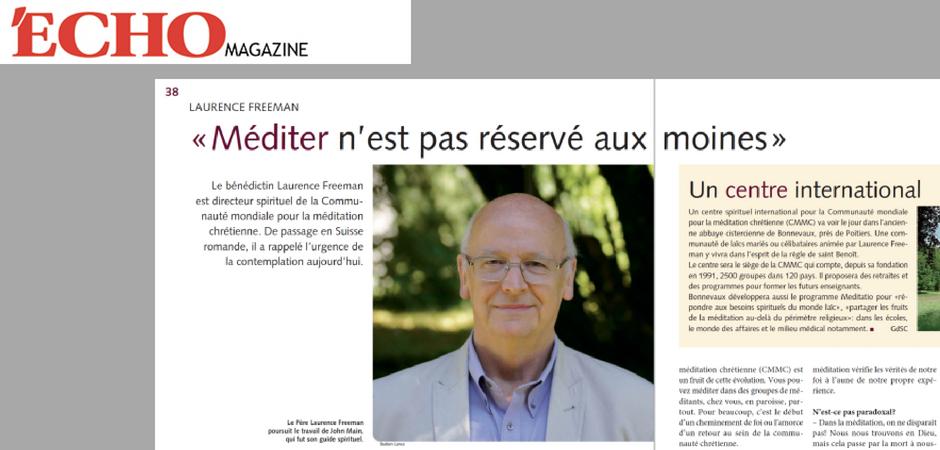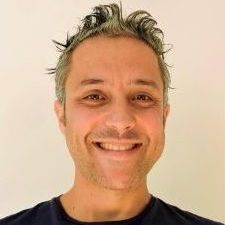The publication Echo Magazine, from Switzerland, highlighted an interview with Laurence Freeman OSB in its latest issue. The title was “Meditation is not reserved for monks”. This is the translation of the story:
“Meditating is not reserved for monks”
By Geneviève de Simone-Cornet
Meeting Laurence Freeman is an experience in itself: we do not come out unscathed. Even without his religious habit – white, because he is a Benedictine monk of the congregation of Monte Oliveto – the man impresses: clear look, firm handshake, contagious smile, and a presence of a beautiful density. Is it because he travels the world to animate retreats and train meditators, in permanent contact with various cultures? Is it because, practising morning and evening meditation, he brings to the world a look of compassion and kindness? To listen to him, to exchange with him, one touches something of the order of grace.
In our complex world of stress, noise and race for performance, is there room for meditation? Is it not the prerogative of “soft dreamers” on the margins of society?
Laurence Freeman: – On the contrary! Many of the problems of the modern world come from a lack of contemplation. We are agitated – do you know that agitation is the patron saint of stress? – we run, everything accelerates. Man needs silence, balance, loneliness and peace, and he craves contemplation. Thus, we are placed before the urgency of a contemplative revolution. For the world, but also for the Church, which is experiencing a crisis of transmission. Far from the many fashionable solutions, Christian meditation, through the process of internal transformation that it sets in motion, is a response to the crisis that our societies are going through. Far from being a flight from the world, it is a practice that changes our attitude and our gaze.
Many believers rediscover meditation. However, it is not such a new practice …– Oh no! Christian meditation is anchored in a tradition that dates back to the Desert Fathers, especially John Cassian, who lived in the 4th century, and it runs through the institution’s history. Vatican II has revived it and opened it to all. If the Gospel is a motor to engage in the world, it also has a mystical side: it is the tradition of Christian meditation, nourished by the prayer of the heart or prayer of Jesus, the center of orthodox spirituality – the repetition of the same sentence, “Lord Jesus Christ, son of God, have mercy on me sinner”. It is not reserved for monks and nuns but offered to everyone in his daily life. Believers have become aware of this, and the World Community for Christian Meditation (WCCM) is a product of this evolution. You can meditate in groups of meditators, at home, in parishes, everywhere. For many, it is the beginning of a journey of faith, for others, it is the beginning of a return to the Christian community.
What is meditation?
– It is a process of human and spiritual growth. Everyone can practice it at their level: I teach meditation to children aged 6-7, and they are very receptive! It is a pilgrimage to the centre of oneself, where Christ dwells. It is about leaving the ego and its confusion to go to the Unifying Self, to enter into the knowledge that God has of himself. When we meditate, we transcend our ego and open ourselves wide to the Self. We go beyond the ritual practice of faith to enter pure prayer. We divinise ourselves, according to the formula of St. Irenaeus of Lyon in the second century: “God became man so that man becomes God,” repeated by St. Athanasius and St. Gregory of Nyssa. Meditation verifies the truths of our faith in the light of our own experience.
Is it not paradoxical?
– In meditation, we do not disappear! We find ourselves in God, but it passes through death to ourselves, our impulses, our desires, all those waves that shake the surface of our being. To meditate is to remain in the immobility of the mind and the body. Thanks in particular to the repetition of a word or mantra – Maranatha, “Come, Lord Jesus” – we enter a process of purification, spiritual deepening and inner transformation.
To meditate, you say, is “to enter one’s inner room” …
– To meet God there. Without chattering, without prayers. In attention to the present moment, interiority and silence. It is not a question of trying to live a mystical experience but, by digging in oneself, to heal our wounds. To live in oneself the work of love, the triple work of receiving, liberating and giving back. It cannot be taught, it’s not a technique.
What does the meditator get out of it? – Physical and psychological benefits – a calmed heart rate, a better sleep, an inner calm especially – and fruits, the fruits of the Spirit enumerated by Saint Paul in his letter to the Galatians: love, joy, peace, patience, kindness, benevolence, fidelity, gentleness, self-control. A look of compassion.
Is it possible to meditate in a parish?
– All parishes should be contemplative! Meditation would introduce silence and calm in the middle of the noise and of the activity. And it would contribute to the rapprochement between Churches. Finally, it creates community – meditating with others helps us to advance in our digging work: it is in meditation that we live in unity. And it’s very important to fight against the loneliness that is eating away at our contemporaries.
What would you say to someone who wants to discover meditation?
– Begin. Come and see. Collected by Geneviève de Simone-Cornet
Echo Magazine – www.echomagazine.ch





